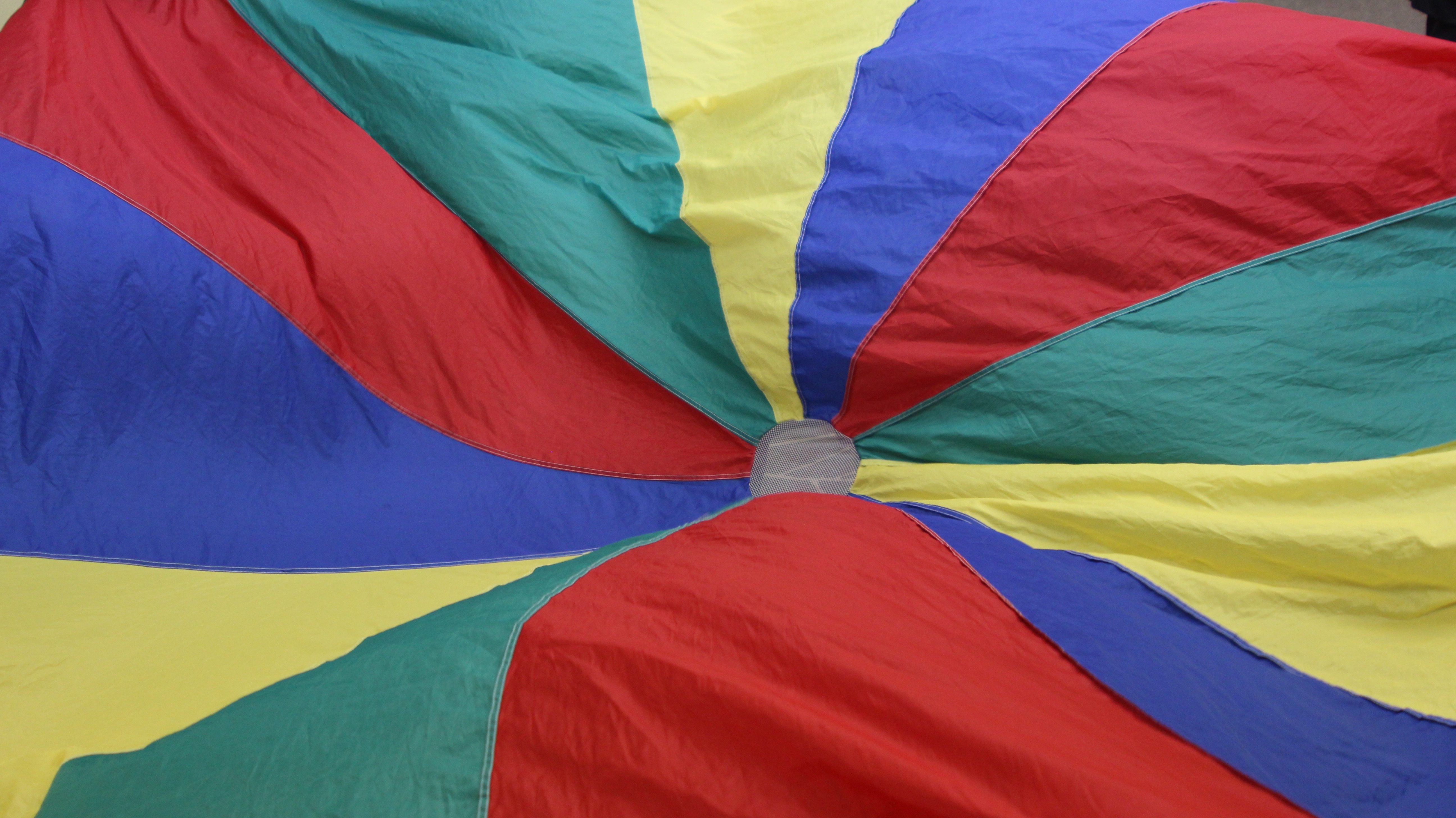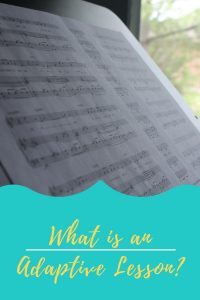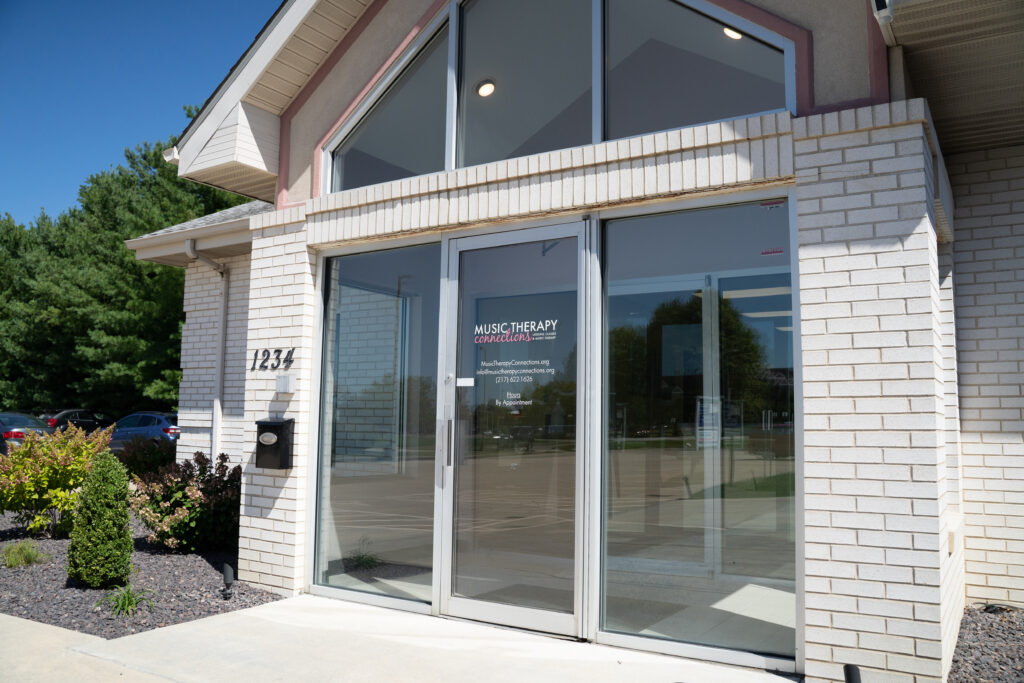by Sammy | Sep 9, 2016 | Intern's Corner

My schedule is officially full and I’m starting to lead more during sessions and adaptive lessons. I’ve also received more constructive criticism, but that is an important part of growing and learning! All of this new information and learning that I am doing and the fact that I am a perfectionist makes it fairly easy to quickly become overwhelmed. Sometimes I feel like there is so much to learn and that there isn’t enough time to learn it all before becoming a professional music therapist.
For those who might be feeling the same way, you might feel like you want to give up and stop trying completely; this is normal and sometimes I feel like I want to shut down too. But perseverance and remembering your dreams and goals is important in pushing through. Remembering that I want to work with children, perform research furthering the field of music therapy, and maybe one day run my own private practice, helps me refocus and continue learning.
During my internship, I have the chance to absorb so much new information and experience every opportunity that arises. I have the chance to learn from my mistakes and work towards being a professional and great music therapist with two wonderful supervisors encouraging me and helping me along the way. As my internship progresses, it will become more manageable and the skills that I am currently learning will become second nature. I just have to get over this hump and the only way to do that is to persevere and keep my goals and dreams in sight. Everyday is a new learning opportunity, and I don’t have to be perfect because no one is perfect!
If you breathe, refocus, persevere, and continue learning then you will become successful no matter what.
Thanks for reading!
Sammy Springer
by Sammy | Sep 2, 2016 | Intern's Corner
Hello everyone!
I can’t believe that I am officially done with my first month of internship! I have learned so much in this past month and am so grateful for all the opportunities that I’ve had so far.
The biggest thing I’ve learned this month, besides everything clinical, is how to be and stay organized. You go from seeing one client or group once a week for an hour during practicum to seeing fifteen or more clients in your internship. It’s definitely an adjustment and extremely important to stay organized. During the past month I’ve figured out some ways to make sure I am organized so that I can concentrate on learning.
I created a song binder that includes every genre of music (music from different decades, movies, Disney, children, pop, hello/goodbye, and movement/instrument songs). When a client wants a specific song and I don’t have my IPad available, I can just look in my song binder for the lead sheet.I also have a binder that has tabs for each day and each client (with just the first initial of their first name) where I keep all my documentation sheets. It’s easier to plan a session when all the information is presented in a concise way under that client’s tab. I also have a binder for each off-site facility that I go to so that I can just grab that binder and go.
Also, I kept all of my notes from college. Inspired by Katey and Rachel, I organized my notes into different categories (such as MT & Medicine or MT & Schools) and placed them into a binder as well. When I go to study for my board certification exam, I’ll be thankful I put in that work so that I can easily reference/review any material.
I know it sounds like a lot of binders, but this system of organization works for me. If you are a current music therapy student or just starting out your internship, I encourage you to create an organization system that works for you that will help make your life easier! My supervisors helped guide me and showed me their methods of organization, which helped me develop mine.
Have a good week!
Sammy Springer
by Sammy | Aug 26, 2016 | Intern's Corner
Hello!
This week, I learned all about time management! In order to effectively take time for self-care, it is important to be conscious of how you spend your time. In college, I waited until I got home from class to do assignments and barely worked on them during my breaks throughout the day. The evening was always when I could concentrate the best anyway. However, so far during my internship, I have learned that this method will not always be the best way to get things done and it prevents me from having much time for myself.
Here are two things that I learned this week about time management that I discovered to be helpful:
1) Leave work at work.
I struggle with this because I concentrate better at night time. However, this week, I learned that if I plan for the next day when I get home at night, I don’t have any time for self-care. I get home late every evening and when I should be relaxing and winding down from the day, I’m planning or working on something. Don’t do that! Plan, document, and prepare at work; only work on minor preparation tasks and practicing repertoire at home. This week, I realized that utilizing the preparation/documentation periods that are built into your schedule during the day to the fullest potential, means that there will be less to do at night, which means more time for self-care. If you take care of yourself, you’re better able to help others.
2) Don’t over plan.
I’m a planner and like to plan out every single thing that could possibly happen during the day or in a session. However, like most of us know, plans leave little room for flexibility and may not fit the needs of the client for that specific day! Of course it’s good to be prepared for everything that could happen and have an outline of the interventions that will be used to target the client’s goals/objective, but every single detail doesn’t need to be planned out; this week, I’ve learned that being flexible during a session is SO important. When something goes differently than what you expected, it is important to have those back pocket interventions you can use, that way the client is always working towards their goals.
Thanks for reading my thoughts!
Sammy Springer
by Sammy | Aug 19, 2016 | Intern's Corner
Hello!
I’m wrapping up my third week as a music therapy intern and I am starting to feel more comfortable with Springfield as well as with my internship. I have the chance to work with so many different people at multiple sites and I feel truly blessed that I am in this environment surrounded by respected and talented professional music therapists! Even though this week I started to get more involved in the students’ sessions and I have loved every minute of it, I’ve encountered some struggles that I am slowly working through.
Confidence. It’s an issue that I have been dealing with recently. Like most other musicians and people in this world, I strive to be perfect in everything that I do and when I am not perfect or succeed in doing something, I lose confidence. This often leads to me not being able to progress or learn a new skill. I realized this week that nobody is perfect and I will never be perfect; it’s okay to make mistakes as long as you learn from them.
I often lose my confidence when I’m singing. When I sing in my car, I sing like no one is watching because literally, no one is watching. But when I sing in front of my supervisors or in other places, I lose my confidence because I am afraid of sounding terrible, which actually makes me more nervous. This in return ruins my breathe support and creates an airy sound and the cycle continues.
If I just think to myself that nobody is perfect and sing like I sing in the car with all the confidence in the world, I can accomplish amazing things. Confidence is an issue for me, but it doesn’t have to be a detrimental. I know that I have the skill set required to sing as well as to be an effective music therapist; I just have to believe in myself and have CONFIDENCE. I’ve started to work on it this week and will continue to do so throughout my internship. I’m excited to look back at this moment six months from now and see how much I’ve grown.
Thank you for reading!
-Sammy Springer
by Sammy | Aug 12, 2016 | Intern's Corner

Hello! I just finished my second week of my internship and I feel that I have learned a significant amount in a very short time. That being said, I am excited to see the amount of knowledge that I will have learned by the end of my internship!
One of the hardest things that I have dealt with in the past two weeks is getting adjusted to living in a new place. I’ve moved around my entire life and while I attended college in Michigan, my parents lived in Georgia and North Carolina; that being said, I am very used to living far from my family. However, since I did live so far from my family and couldn’t see them for months at a time, I built friendships as well as a support system with the friends I met in classes, extracurricular activities, and at different jobs. Moving to Springfield has been interesting for me because I no longer have that immediate support system physically surrounding me. I know that I can always call friends and family on the phone or on Skype, but sometimes life gets busy.
There are some things that I have learned in these past two weeks that have helped me cope with living in a new place that might help students looking at internships far away or other interns who are going through the same thing as me!
When you’re not at your internship, make sure you get out of your apartment/house.
This is the hardest for me because I don’t like driving in new places. However, it is extremely important! A person can only watch Netflix or do paperwork for so long. Leave your apartment and go exploring. If you’re living in a city, walk around downtown or explore a nearby mall. Look online for things to do in the city or town where your internship is and make sure you get out and do the ones that interest you!
Get Involved.
Find a hobby! Volunteer! Do something that you love and get involved in anything. It’s a perfect way to meet new people and start developing that support system away from home or college. I am looking into options to volunteer right now and have started going to church and getting involved that way in order to meet new people. This has been the biggest challenge because in college, you’re forced to meet new people every day. However, in the “real” world, you have to find ways to meet new people without relying on class or a job.
Be open and honest.
When you feel overwhelmed about being in a new place, make sure you’re open and honest to your supervisors or call up a friend or a family member and share with them about how you are feeling. Living in a new place is scary and it’s important to know you are not in this alone!
I have found those three things to be helpful with getting adjusted to moving to a place where I know absolutely no one. It’s scary at first, but I am excited to meet new people and start getting involved with different activities!
Thanks for reading!
-Sammy Springer
by Alisabeth Hopper | Aug 10, 2016 | Materials & Supplies, MTC, Reflections, Resources, Tips & Tricks

You may be wondering, what on earth is a Guitten? As the name suggests it is a small mitten (without the fingers of course) for the head of your guitar! It securely covers the tuning keys. Everybody sing it with me… hallelujah!
And yes, it really is as wonderful as it sounds!
I know we have all been there. You are strumming along and having a wonderful session when you strum your guitar and it happens. Your beautifully tuned 6-string is now 4 keys way to low with a string dangling from the fretboard and you realize your guitar has been compromised. More than likely one of your clients decided to curiously turn and twist those tempting tuning keys on your guitar. At this point retuning your guitar may be untimely, and your only option may be to put it away.
Let me be honest here, I heard about the Guitten from their table at a music therapy conference. I liked the idea when I saw them and nabbed one for myself. But in all honesty I would consider this a must have for all MT’s. It is a wonderful tool and they come in all kinds of colors and designs.
Want to know more? Check out their website here.
by Sammy | Aug 5, 2016 | Intern's Corner, MTC

Hello everyone! My name is Sammy Springer and I am the new intern at Music Therapy Connections. As everyone knows, Alisabeth was the previous intern and is now currently a music therapist at Music Therapy Connections! I will be carrying out her tradition of writing blogs for the Intern’s Corner for the next six months. That being said, I thought I would share some information about me this week so you all could get to know me a little better.
I grew up in Middleton/Madison, Wisconsin and went to college to study music therapy at Western Michigan University in Kalamazoo, MI. My primary instrument is the flute and I have been playing since I was eight years old. However, I also love playing the guitar and the piano! Since my junior year of high school I knew music therapy was the right career path for me; it seems unbelievable that I just finished my first week of my internship, but nonetheless, here I am fulfilling my dreams!
My first week as an intern was a little overwhelming, but overall, exciting. I am so excited and ready to learn everything that I can during the next six months! During this week, I mainly observed sessions where I was able to learn a lot about songwriting, assessments, self-care, and different therapeutic processes.
Here are just some of the things that I learned this week that might be useful to students and other new interns:
- Take a journal with you everywhere.
My internship directors recommended this to me this week and I found it to be extremely helpful. Just this week I filled pages with observation notes, lyric ideas, and lists of everything that I either needed to do or remember. Also, journaling or even taking notes during sessions throughout the day is a wonderful way to go back and reflect at the end of the day. It’s an important part of the learning process to reflect on everything!
- Writing original songs is not that scary!
Writing your own songs is important because you can write a song that can be tailored to each individual and their specific goals/objectives. Writing original songs and becoming comfortable sharing them is a goal of mine. It may seem taunting at first, but it really isn’t that bad! I encourage everyone, especially students and new interns, to try writing their own songs and sharing them. I wrote one this week and had to share it with my supervisors as well as the other music therapists, and I got through it just fine.
I am not sure how many times I have heard this throughout my lifetime, but it is just starting to click for me. Going to bed at a decent time, eating healthy, and taking time out for ourselves each day is extremely important. This week I started going to bed early every night and noticed a huge increase in my energy level. Although, I am not very good at practicing self-care right now, but it is something that I will concentrate on practicing for the rest of my life. If we don’t take care of ourselves, there is no way that we can help other people. I am excited to learn more self-care techniques and start practicing them!
Thanks for following me on my journey!
*Sammy Springer
by Katey Kratz | Jul 28, 2016 | MTC, Resources, Self Care
I cannot believe we are almost in August that we have a new intern starting on Tuesday!! My oh my, how time does fly. Both Rachel and I have had so much going on the past few months, on top of everything exciting happening at MTC, that we have felt a serious need to get back in touch with our mantra for this year: simplify, streamline, self-care.

We developed our mantra in late December of last year and have been actively working toward all three aspects. We’ve talked a lot about this mantra and ways we’ve been working toward those goals in several blog posts I’ve linked to below. Simplifying and Streamlining have been huge and exciting areas of focus and things we talk about almost daily as we continue to grow our team and expand our services. But with all of the hustle to achieve those goals, self-care has sometimes taken a back seat.
We value our team members, student, clients, and families and want to be our best for them every day. We also value our interns and understand that internship is a very stressful time and a huge transitional period from being a student to a practicing professional.
We want to lead by example. Putting focus on and implementing our own self-care routines helps us to be our best selves in all we do. It allows us to be more present, provide a positive example for those around us, stay balanced in work and in life, and simply be accountable. Self-care is a continual journey and something we really want to practice.
Rachel and I spent time on Tuesday talking about the importance of self-care and sharing some of the ways we practice self-care in our live Facebook video.
As we continue this self-care journey and as Sammy begins her internship, we’d love to hear some of the ways your practice self-care and what helps you to find balance in your daily life. Looking for other ideas to jump start your self-care journey? Check out the other blog posts we’ve written on this topic:
Three Words for 2016
Simplify, Streamline, Self-Care
The Intern’s Corner (Week 23)
http://www.onagoodnote.net/2016-simplify-streamline-selfcare/
http://www.onagoodnote.net/2016-simplify-streamline-self-care-part-2/
http://www.onagoodnote.net/2016-simplify-streamline-self-care-part-3/
http://www.onagoodnote.net/self-care-check-in/
http://www.onagoodnote.net/its-tuesday-and-im-exhausted/
by Alisabeth Hopper | Jul 27, 2016 | Class Registration, Parents, Services
So you have heard about Music Therapy online, through a friend, or even on Facebook and you are interested in services for you or a family member but you have a few questions first. We completely understand and we want to help you to determine if Music Therapy is right for you and your family!
Here it is, these are the three big concerns we hear when asking about Music Therapy services.
1. I can’t play an instrument!– This is a big one and I’m going to keep it short and sweet. A client does not need to understand music, or know how to play an instrument to be successful in Music Therapy! Between the three Music Therapists I have the opportunity of collaborating with I know that we have Music Therapists working with people from infancy to older adulthood. You need only to be open to a new experience and growth!
2. I don’t think I can afford it if insurance does not cover it. – Unfortunately, at this time there are not many Music Therapy practices in Illinois in which you can bill insurance for services. But don’t let that keep you from pursuing services! Our owners here at Music Therapy Connections are conscientious of the cost and purposely price our services at the cost of a co-pay. That’s right, you are paying the same rate as you would if you were billing insurance. It is important to us that those who need services have access to them.
3. I don’t know if Music Therapy can help me.– As Music Therapists we assess and treat goals which are academic, psychological, motor, speech, memory, and work with people who have diagnoses such as Autism, ADHD, Parkinson’s, Alzheimers, Depression, Anxiety, and the list goes on. The bottom line is that, if you’re interested go ahead and see a Music Therapist. Do an assessment and give it a try. You may just find a fantastic resource for you and your family!
Click here to learn more about Music Therapy for you and your family!
by Alisabeth Hopper | Jul 21, 2016 | Parents, Resources, Services

Put simply an adaptive lesson is a lesson where an adaptation is necessary for the student to thrive in their lesson environment. Typically, we think of adaptive lessons as being directed to students with disabilities and diagnoses. Yes, we have students of all ages and abilities, and when we say all we mean all!
That being said, there are many students who may benefit from adaptive lessons who do not have a diagnosis, or may not have a lifelong diagnosis. The easiest way to think about this would be if a student wanted to learn piano, but was recovering from a severe hand injury, we would adapt the material provided so that the student is progressing regardless of the inability to use their hand.
You may be wondering… but, can’t any music teacher do this? What makes your lessons different? Well, it is true that there are many fantastic teachers out there. Our approach is a bit different in that we place our adaptive lessons with our music therapists! Our board certified music therapists have studied how music affects our brain, bodies, and how to apply it to induce a positive change. We have training in diagnoses and have an understanding of counseling skills. We can apply our non-musical training to any lesson to better help that child to succeed regardless of any other limiting factors.
We all carry around labels, positive or negative that affect how others see us, and how we see ourselves. But at lessons our students are students. With or without a diagnosis we are there to help them achieve their goals. Period.














